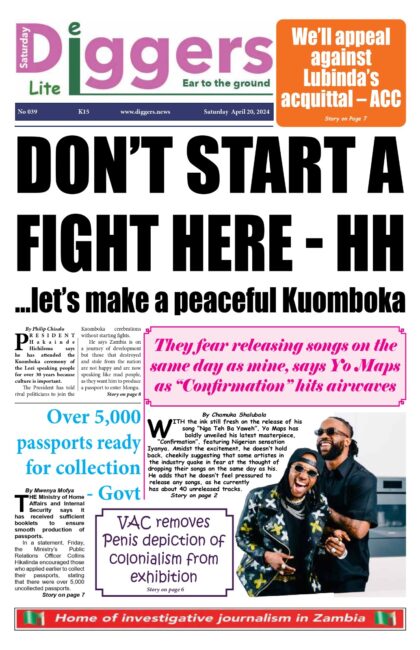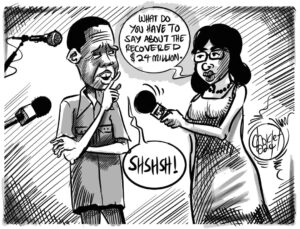Zamtel Plc says pricing on its data bundles will not be increased despite government’s move to charge a 30 ngwee per day tariff on Internet calls.
And Zamtel has welcomed the Statutory Instrument (SI) that introduced a 30 ngwee per day tariff on Internet calls, justifying the development as helping to cushion the telecommunications company’s costs in providing services.
Commenting on the SI, Zamtel corporate communications manager Kennedy Mambwe said the company is not likely to increase its pricing on data bundles in the wake of the 30 ngwee tariffs on Internet calls, adding that Zamtel would continue to aim to be the most affordable network provider on the market.
“Our goal is to make sure that the communications services that we offer remain as affordable as possible. We are launching 1,009 new sites; all of them capable of carrying data traffic, and most of them are situated in rural areas. So, we want to make sure that our pricing is suitable for every Zambian so we will probably remain the most affordable network. We just reduced the cost of data and I do not see us increasing any time soon; we will remain the most attractive network on this market,” Mambwe told News Diggers! in an interview.
And Mambwe welcomed the SI and justified the development.
He also explained that the move was done in view of the need to compensate telecom companies for the cost of providing Internet services.
“For us, the introduction of that 30 ngwee is a welcome move because it is part of the regulatory process to mitigate the impact of the OTTs [Over-the-Top Services]. So, it is not a question of whether or not anybody was consulted; it is a question of: ‘are the telecom companies in the world being impacted by the OTT services?’ And it is an emphatic ‘yes!’” Mambwe added.
“The reality is, OTTs is a global problem affecting every telecom company the world-over because what has happened is that, traditionally, every telecom company has had its revenues generated from voice calls and SMSes. Now, the advent of the OTTs, such as WhatsApp and ‘WeChat’, they have cannibalised into the revenue streams of the telecom companies because now, access to data has become cheaper; people can afford it, and, therefore, they can bypass the traditional way of communicating.”
Mambwe stressed that all applications on any network need an existing infrastructure to function, and that social media platforms have been operating for free.
“But the one thing that people overlook is the fact that, for every App (Application) to work, it rides on an existing infrastructure; people download these Apps on a SIM card that is registered with a particular network. What that does is that, as more people are getting that particular App, consuming a lot of data, it’s clogging the capacity of networks, but it’s not returning value to the network that is hosting it,” Mambwe argued.
“That is the biggest problem that telecoms, the world-over, have been facing, and this is a debate that has been discussed, even at the International Telecoms Union, which is the mother body for all telecoms the world-over. ‘How do we sustain viability of every telecom company when these free services are actually riding’ They are taking a free ride on infrastructure that they have never contributed to as far as investment is concerned.”
Asked whether Zamtel as a particular network was involved in the consultative process on formulating the 30 ngwee per day tariff, Mambwe confirmed the company was engaged through ZICTA, the regulator.
“As a stakeholder, yes, we were engaged by the regulator because you cannot regulate something that we are not aware of. As far as we are aware, they engaged the key players,” Mambwe responded.
And asked whether the 30 ngwee tariff amounts to double-billing as some other stakeholders have argued, he disputed the assertion.
“One thing that we need to learn as Zambia is to be patient! We always rush to conclusions; this is under consultation. Yes, the SI has been proposed; the implementation road map is another. So, the question of speculating about double-billing, for now, is not an issue because the SI is far from even being drafted; nothing has been put on paper – it is a proposal, which has principally been approved by Cabinet, but consultation is still ongoing. So, I do not think that we can rush into discussing double-billing; it is too early, until we see the content of the SI,” he responded.
He further clarified that the company had not started charging its subscribers the 30 ngwee tariff.
“No one has started and no one can start because there is no law to back it at the moment, it’s just a proposal,” Mambwe said.
But when pressed further on whether the SI sounded feasible to implement on consumers who are already subjected to existing charges on bundle usage, Mambwe explained that the charge would not be punitive.
“It is not necessarily punitive on the consumer. The consumer wants the App, don’t they? And the Apps are coming for free. In other countries, China for example and Dubai; they’ve banned some of these things for one simple reason: they want to protect their infrastructure because you have all the citizens hopping on board, but they are no returns to the nation! So, the question Zambians should be asking: ‘would you rather pay a 30 ngwee or risk this thing being banned?’ I would rather pay a 30 ngwee and continue enjoying because clearly, this is part of our lifestyle. I can’t imagine life without WhatsApp,” said Mambwe.
Earlier this month, Transport and Communications Minister Brian Mushimba said the 30 ngwee charge on Internet calls was “inconsequential” and meant to address revenue losses created because of the shift from traditional ways of making calls.












